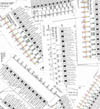
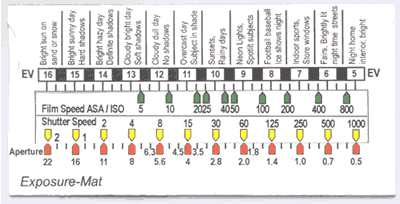
As a collector of classic rangefinder cameras I was searching the internet, looking for tips on exposure and exposure meters. When I found Rick Oleson's simple cut out light meter, I am also am occasional paper card modeler so this idea appealed to me. In no time it was printed it out and immediately saw the potential for improvement. So it was out with trusty old Adobe Illustrator and many prototypes later I had the Exposure-mat and the Exposure mat MINI (True to Ricks original for miniature cameras) soon followed. Both feature on this site
The Exposure-mat is based on the principle that at an aperture of f16 on a bright sunny day which can be quantified as a light level of LV 15 using ISO 100 film. Given these conditions your pictures will be properly exposed when the shutter speed is the reciprocal of the film speed i.e. 1/100th of a second, modern cameras usually have 1/125th of a second as the nearest shutter speed to this, which is within 1/3 of a stop and therefore quite acceptable. Far better explanations of this phenomenon are available from Fred Parker at www.fredparker.com and Dick Sullivan at Flyspec Publications.
EV vs LV
You may strike a bit of confusing regarding EV (Exposure Value) and LV (Light Value), simply LV is the actual brightness of the light where as EV is the LV value at a certain ISO film speed rating which relates to the film and shutterspeed combinations.
Using The Exposure-mat
Simply align the ISO film speed you want to use with your current estimate of the Light Value at the top of the Exposure-Mat then read the possible aperture and shutter speed combinations at the bottom of the Exposure-Mat.
Example 1
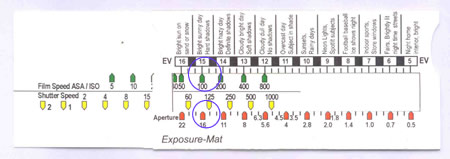
In
example 1 we set the Exposure-mat for ASA 100 film on a bright sunny day,
EV 15. The bottom scale matches 1/125s shutter speed to an aperture closest
to f16.
(The f16 Sunny Rule).
Example 2
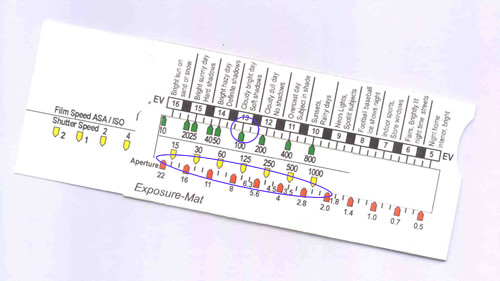
In Example 2 we set the Exposure-Mat for ASA 100 film on A Cloudy Bright Day, with soft shade, EV13. The bottom scale shows us the range of combinations from 1/15s at f22 through to 1/1000s at f2.8.
Conversely we can set the bottom scale first by setting the desired Aperture and shutter speed combination and reading the film speed required for the lighting conditions. ie 1/500s at f3.5 on an overcast day or when the subject is in shade, EV11 would require ASA 400 film.
What Use Is The Exposure-Mat To Me ?
1 It's a light meter to fit in your wallet.
2 It's a light meter you can afford to have with every camera you own.
3 It's an excellent tool for honing to help you learn to read light conditions and learn exposure to the degree where you don't need a light meter.
4 It's an easy way to evaluate light meters on old cameras and meters at markets and garage sales.
5 For cameras with fixed shutter speeds you can calculate what film speed is best for the anticipated light conditions.
It's a easy really print out the pdf file on to 140 gram card cut out and fold and glue following the printed instructions. All you need ia a Craft Knife, a Ruler and some Glue
Exposure-Mat is provided in two versions as Adobe .pdf files. If you don't already have Adobe Acrobat, you will need to download and install it on to your computer (Windows, Mac or Linux). Follow the link to the left to get Acrobat Reader.
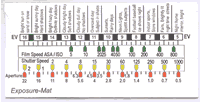
Exposure-Mat
(125x60mm - 16Kb )
![]() right
click to download pdf
right
click to download pdf

Exposure-Mat
MINI (90x50mm - 18Kb)
![]() right click to download pdf
right click to download pdf
The exposure mat is provide free for personal use for commercial uses licensing is available as is the space on the back of the download version email me for info
The exposure mat is provided free for personal use. For commercial users licensing is available as is the space on the back of the download version. e-mail me for pricing. Informatiques
Feedback and suggestions to Informatiques
| Fred Parker | The Ultimate Exposure Meter | |
| Dick Sullivan | Who Needs A Light Meter anyway? | |
| Rick Oleson | Freebie Pocket Exposure Calculator | |
| Kodak | www.kodak.com | |
| Fuji | www.fujifilm.com | |
| Card Modeling | www.spacestation42.com |